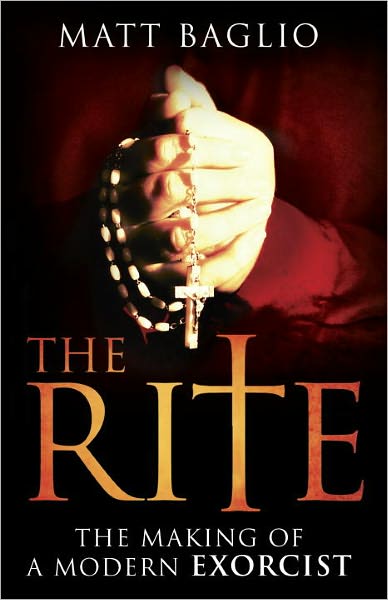 The Rite (2010 paperback) by Matt Baglio is one of the best books I have ever read. I give it 9 out of 10 stars.
The Rite (2010 paperback) by Matt Baglio is one of the best books I have ever read. I give it 9 out of 10 stars.This is the book that served as the inspiration for the movie The Rite (2011) starring Anthony Hopkins, which I reviewed in January.
Both mediums, particularly the book, pleasantly treat the subject of exorcism as one that requires caution. But the book is much better than the movie. The book is non-fiction and follows the training of San Francisco priest Father Gary Thomas as he journeys to Rome to learn the trade of exorcism (the movie character Michael Kovak is said to be based on a Chicago-area exorcist). We are given in most chapters glimpses into the mind of Father Gary for whom exorcism was mostly an alien enterprise prior to his Roman visit. The reader sees through Father Gary's eyes for the first time truly horrific and unexpected events. Yet there is always a balance of humility and a desire for prudence in this learning priest's disposition. Due consideration is always given to science in accord with the Church's advice to utilize the examinations of medical doctors. One of the exorcist's primary goals is to discern when a disorder is natural or supernatural.
That brings me to another great quality of this book. There are some tangents from Father Gary's direct experiences. These tangents are typically informative and are useful in understanding the subject matter in general. For instance, on page 204, Baglio finishes a discourse on several scientific studies into potential possessions and human disorders with: "If true, quantum entanglement could help to explain how things like healing from a distance, or the power of prayer, actually work." Baglio's prudential consideration to detail and explanation make me suspect his witnessing of the Church's cautious training on exorcism lead him to the same prudence.
As well, the book is fraught with side comments on exorcism from a other exorcists including Father Gabriel Amorth who is Rome's chief exorcist, and a good number of other exorcists with whom the author had contact. This is a critical part of the value of this book. For those interested in the subject of exorcism, comparing and contrasting the experiences of actual exorcists is invaluable. The reader learns throughout the book that demons often exhibit similar behavior when manifesting. Yet sometimes behaviors are unexpected. This is where the array of experiences among the exorcists is especially useful in developing the Church's knowledge of the subject matter. Just as scientists throughout the world compare and contrast their various results to accelerate the learning process, so too do these appointed exorcists. This book is fantastic for detailing a variety of demonic behaviors.
One one occasion, Baglio describes the disparity of experience by different people present at the same exorcism (page 149): "During the exorcism, Father Gary had the overwhelming sensation that the room was suffocatingly hot, while the priest from Indianapolis smelled a terrible 'over-powering' stench." Were multiple demons at work? Was the same demon attempting to confuse? Was there something about the priests that made them each sensitive to particular phenomenon? It is details such as these that inform students of the subject much of the mystery involved in discernment and liberation and why so much care must be taken.
Contrary to one of the weaknesses of the movie, the book's Father Gary is not a "doubting" figure with a flippant attitude like his parallel film character. Father Gary enters the arena not knowing what to expect. He may ask himself "why," as the reader learns during a description of a near-fatal accident earlier in Father Gary's life, but he does not exhibit the sustained defiance of many shaky priests that are native to some Hollywood productions.
One of the saving grace of the film was echoing some of the book's details of exorcisms. The book The Rite is especially valuable for its first-hand accounts of actual exorcisms. During these scenes, my eyes were glued to the dramatic and detailed accounts of levitation, demonic dialogue, feats of strength and contortion, and other phenomenon that baffle even scientists. Those looking for a window into the actual battle of the experience will not be disappointed. From the first page, the struggles and tactics of demons during an exorcism are detailed.
A humorous moment preserved in the film, perhaps taken from the book, was a priest answering a phone during an exorcism (page 103). In comparing the two works, this parallel detail stood out since it was unusual. The book follows the moment with a description of how the priest immediately returned where he left off and the victim resumed the same disposition she had when she left. This additional information in the book leaves the reader with the feeling that the exorcist was in complete control, whereas in the movie the viewer is left wondering if Anthony Hopkins' character is crazy.
The book The Rite also includes a number of other valuable details. This includes pertinent Scriptural verses, reference resources, and perhaps most valuable to anyone is information on those most at risk for possession. Baglio often refers to the victim's experiences in the occult prior to their admission to exorcism.

